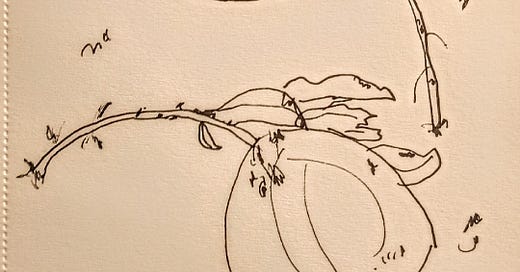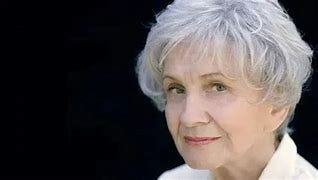We all have secrets.
A secret is something known by one person or a few people that should not be told to others. It is something we may have done, or it has been done to us. Whatever the reason, we may not want others to know about it. Or just some, a select few people.
Secrets burden us and make us feel bad. We may want to share it, but should we? What would they do with the secret? What would they think of us? Would they tell others? When others confide in us and say, it's confidential, we are bound to keep it to ourselves. But do we? We feel important that we have been chosen with this information. And we sometimes tell others.
Secrets have come to my mind as one of my favourite writers, Alice Munro, has been in the news recently. Canadian by birth, Munro is considered one of the most accomplished and influential short story writers of the 20th and 21st centuries.
Her daughter Andrea Robin Skinner published an essay in The Toronto Star that in 1976 she had been sexually abused by Munro’s second husband and her stepfather Gerald Fremlin when she was nine years old. Skinner told Munro about the abuse in 1992 when she was 25 years old. However, she had told other family members, including Skinner's father, stepmother, stepbrother, and sisters in 1976, the year it took place. The family kept it a secret from Munro for 16 years. Her father continued to send her to be with Munro and her second husband after being told of the abuse.
Skinner disclosed that Fremlin repeatedly exposed himself to her, masturbated in front of her, and made sexually explicit statements to her until her adolescence.
I came upon Munro and her work after I moved to the US in 1973. I read one book (I can’t remember the name) and then the next and the next. I liked her style of short story writing, its simplicity and directness. There was no padding, no great explanations, none of all that. Most of her work was set in Huron County in southwestern Ontario, where she lived. Her stories explored human complexities in a simple prose style. A winner of numerous awards, I was delighted when Munro won the Nobel Prize in Literature in 2013. She stopped writing around 2013 and died in May 2024, at the age of 93.
After learning of the abuse, Munro separated from Fremlin for a few months, but went back to him, telling her daughter that she had been "told too late". Munro's other daughter Sheila said that "Alice wasn't able to sustain being alone and being apart from him. She told me that she couldn't live without him." In 2005, Fremlin pleaded guilty to sexual assault and received a suspended sentence and probation.
My first reaction to this information was one of shock and sadness. Munro’s old and fragile face came to my mind, and I wondered what went through her mind when her daughter told her about the abuse, sixteen years after the incidents had taken place. I tried to imagine how Munro felt when she realised that all other family members – her ex-husband, her other children, and his children – knew about it well before her. No one had told her. I also felt the suffering of her daughter and other siblings.
The aftermath of the expose of the abuse has created a tizzy in literary and non-literary circles. There is shock, horror, and dismay over the revelation. And there is judgment about Alice Munro deciding to stay with the abuser of her daughter, after telling her daughter that ‘it was too late.’
However, we interpret this comment of Munro’s, she may have referred to that she had been too long with Fremlin, or she had been told too late after the incident. While she did move out of their home for a few months, she returned to Fremlin. I wonder what went through Munro’s mind during this move away from Fremlin, the return to him, and her thoughts till the day she died.
As a psychotherapist, I hear similar stories from my patients. Young boys and girls in families are being abused by older family members, known to the parents. Parents sometimes believe their children and other times ignore them. Children who are abused sexually, emotionally, or physically carry these scars into adulthood. It is often difficult for them to form intimate relationships as they become adults. Therapy can help in such cases.
According to sources, Munro’s childhood was marked by a difficult relationship with her stepfather, who was physically abusive towards her and her mother. This traumatic experience is reflected in some of Munro’s short stories, which often explore themes of family dynamics and the lingering effects of abuse. Munro has spoken about how her difficult upbringing influenced her writing and worldview.
Skinner, in telling her story, may be able to heal. I don’t have much information about what happened to Skinner other than she married and has children and is involved in meditation and healing. This is good. However, this healing has not enabled her to forgive her mother, who had her reasons to stay with Fremlin. It wasn’t about choosing Fremlin or her daughter. That would be Hobson’s choice.
Many women, in similar positions, facing physical, emotional, or sexual violence, choose to stay with their partners. The reasons are varied. They feel they have more to lose than gain if they separate. They accept their fate.
In calling out Munro for not being more proactive when she got to know about the abuse, there is an assumption that as a mother, she would naturally side with the daughter. This is a presumption. Many women when they become mothers, especially if they have a career or are more passionate about something other than mothering or parenting, have choices other than those who choose to be full-time home-makers, caring for the family. It's family first. But many women don’t feel that way.
Some individuals and organisations working in the abuse and trauma space disagree with my approach to forgiveness as an essential ingredient to healing. In my work, I feel and think it’s the only way forward, in the belief that the abuser did not know better, and if they did, they would have behaved differently.
Abuse of any kind is an exercise of power, we have come to know. It's not only men who are in positions of power. Women too can abuse their power and exploit others. None of this behaviour is right, but understanding that it doesn’t make them a bad person. In most cases, they have faced abuse themselves and cannot admit to their urges to abuse those more vulnerable.
The proclivity to abuse is an illness. Decades of experience in incarcerating offenders has shown that unless there is therapy as part of the removal of offenders from society, it is of little use.
In speaking out about her abuse, Skinner has exposed a side of Munro that most of us did not know. Does that make me like her and her work less? No. I feel bad that she had to deal with the information that her intimate partner and husband did this.
I will continue to admire Munro and her enormous body of work. I don’t think less of her. I see her as human. And as humans, we are all flawed. Some more than others.






